On the Attainment of the Knowledge and Conversation of One's Holy Guardian Angel, and the True Purpose of Life
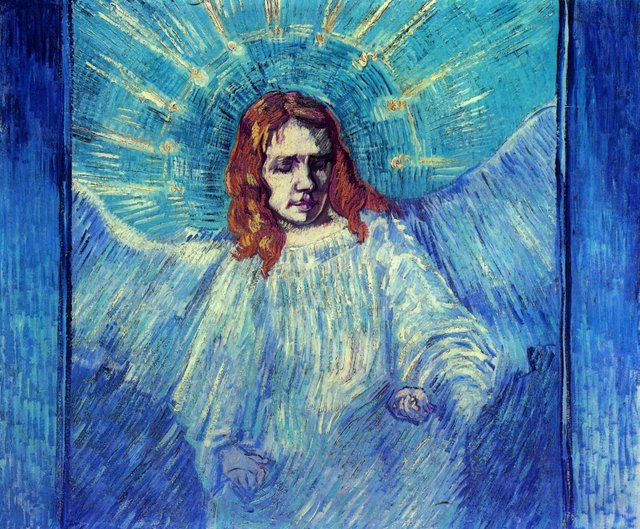
Vincent Van Gogh - Half Figure of an Angel, after Rembrandt - Saint-Rémy: September, 1889
That whole central tenet of Thelema "Do what thou wilt shall be the whole of the Law. Love is the Law, love under will" has often been mistaken to mean that we can do whatever we want with disregard for how this would, or could, affect others. The author of this quote, a British Magickian who went by the name of Aleister Crowley, had with his thoughts about Free Love, recreational experimentation with drugs, and his rebellious Spirit which challenged almost every norm of conventional society - long before any of these things were introduced to the wider world- caused a lot of controversy during his lifetime, resulting in him being denounced as the "wickedest man in the world" by his contemporaries. Even though a lot of what Crowley did and stood for is now being seen as normal, or at least becoming more and more accepted by large parts of our societies, the label stuck, and what was once "the wickedest man in the world" seems to have turned into "the wickedest man who has ever lived".
But what did Crowley really mean when he proclaimed that "There is no law beyond Do what thou wilt" and that following, performing, and staying true to our True Will was the best way to lead our lives, leading to the greatest amount of happiness for the individual? To answer this question we first have to understand what is meant by Will. True Will is being defined as "a person's grand destiny in life" and "a moment to moment path of action that operates in perfect harmony with Nature". Thus "Do what thou wilt shall be the whole of the Law" does not mean that one can do whatever one wants or feels like doing, but rather it means staying true to our lives purpose, to stay true to the Will of Nature, or to be even more specific to stay true to the Will of the Divine within and which is Nature.
As everything within Nature seems to have a function, it makes sense that we as individuals too all have our own unique function and our own unique place in the Universe. This is being made even more clear by Crowley's other famous quote, which is: "Every man and woman is a star" with which he implies that if we all follow our own unique paths, in accordance with the Will of Nature, like as it is with the movement of stars in the heavens "there would be no clashing. “Every man and every woman is a star,” and each star moves in an appointed path without interference. There is plenty of room for all; it is only disorder that creates confusion."
He also explains that "[this would be] the apotheosis of Freedom; but it is also the strictest possible bond." The meaning of "Do What Thou Wilt" is thus very far from doing whatever you like.
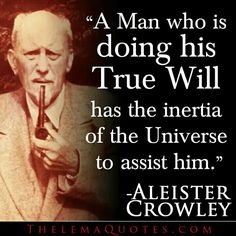
The idea however, that we should do nothing but our Will does not originate with Crowley. Plato, in The Republic defines justice as:
“We've heard many people say and have often said ourselves that justice is doing one's own work and not meddling with what isn't one's own ... Then, it turns out that this doing one's own work-provided that it comes to be in a certain way-is justice.”
And on how we can find out more about the True Will of our children he says:
“You should provide the education to be a play for them. Accordingly
you will see better what they are inclined to from their nature”
Then there is the quote attributed to Heraclitus, "Aion is a child at play, playing draughts; the kingship is the child’s" which Heidegger interprets as:
“The Geschick of being, a child that plays, shifting the pawns: the royalty of a child -that means, the arkhé [source, origin], that which governs by instituting grounds, the being of beings. The Geschick of being: a child that plays"
The important word here is Geschick, which in the context Heidegger uses it here has been translated as destiny and fate. Thus, according to Heideggers interpretation of this quote , Aion who is the Orphic God of eternal time and the source of the Universe, has childlike play as an important quality of Its fate and destiny (or Will).
And Nietzsche's take on the same quote:
"In this world only play, play as artists and children engage in it, exhibits coming to be and passing away, structuring and destroying, without any moral additive, in forever equal innocence. And as children and artists play, so plays the ever living fire. It constructs and destroys, all in innocence. Such is the game that the aeon [Aion] plays with itself. Transforming itself into water and earth, it builds towers of sand like a child at the seashore, piles them up and tramples them down. From time to time it starts the game anew. An instant of satiety - and again it is seized by its need, as the artist is seized by his need to create. Not hybris but the ever self·renewing impulse to play calls new worlds into being. The child throws its toys away from time to time-and starts again, in innocent caprice. But when it does build, it combines and joins and forms its structures regularly, conforming to inner laws."
According to Nietzsche's interpretation, the Will of Aion the Child, is like that of an Artist seized by the need to create, and to play is to create (within this context). As it is pretty much beyond doubt that we - together with the rest of the existing Universe - all come from the same source, it follows (or is logical to assume) that we, together with everything else in the Universe, inherited that same quality of That Child which Plays, and that creating in accordance with our own unique Nature is the next logical step; to act in accordance with our True Will.
Not to follow your True Will would be like stopping yourself from playing, creating; like stopping yourself from being playful and and to learn with the curiousity like that of a child; like stopping yourself from developing along what would be most natural. This is equal to stopping yourself from truly being alive.
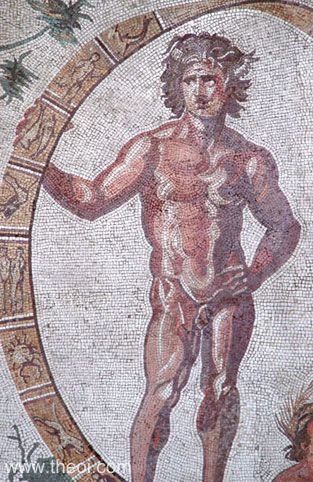
Aion standing inside of the wheel of the Zodiac - Greco-Roman mosaic C3rd A.D.
But yet we live in societies which often have other objectives as their main goal, and who don't see facilitating the personal development of the individual within given society as a main priority, our dreams and the following of our dreams are often sacrificed for a false sense of security, and so is living and acting in conformity with our True Will. The main priority of capitalism is to create more wealth. Creating wealth then becomes the reason why people choose the education they choose, or spend the greater amount of their time working a job they don't like; useless jobs which a machine could do better and with no prospects of leading toward a sense of fulfillment or Spiritual growth. It's a wicked game which is being played where one has to either swim, or drown; but even swimming doesn't ensure one's safety, because every so often that green paper pyramid we've build, this stairway to heaven which should provide us access to God and Freedom, comes crashing down upon our heads again. That is, our heads; not the heads of those fat cats at the top of the pyramid, who don't see us as humans or Spiritual beings capable of Spiritual growth, but who instead see our flesh and our bodies, our sweat, our hopes, our dreams, our humanity, all purely as something providing them with a soft ground to land on. But as the Bible has demonstrated with the story of the Tower of Babel, and Abraham Maslow in more recent times with his pyramid of needs: Building towers, or creating pyramid schemes using nothing else but material wealth or substances as our building material, has never brought us anywhere closer to the Divine nor toward that ultimate form of Freedom which can only be attained through alligning ourselves with the Will of Divine within us. That Freedom to be that which we truly are.
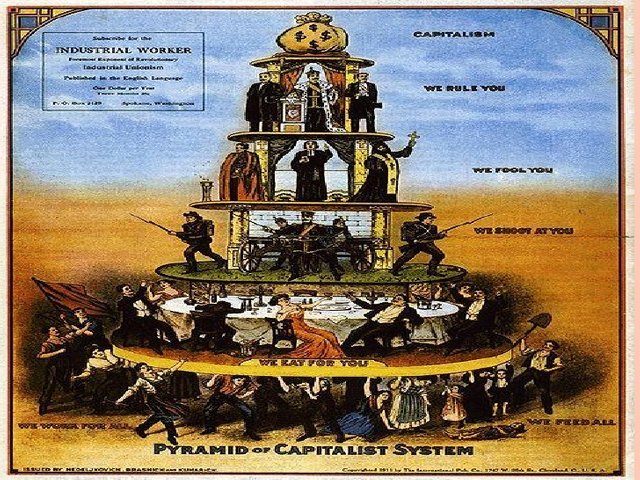
The pyramid of capitalism, putting money at the top.
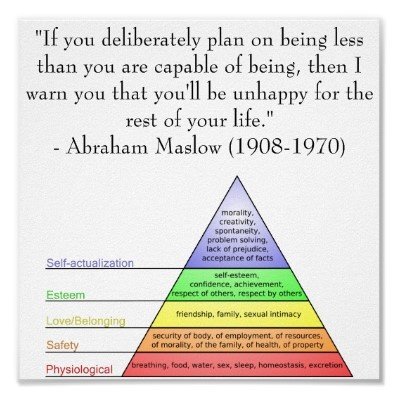
Maslow's pyramid, putting money at the near bottom as part of a mechanism of safety.
Ken Robinson, who is one of the most vocal opponents of our current system of education, and who criticizes the current practice within this same system of killing the natural process of Self-actualization, playfulness and creativity within our children - and which instead tries to mold them into what society wants them to be - caused quite a stir when he voiced his concerns in a Ted Talk which went viral, and which is still Nr. 1 on the list of Most Popular Ted Talks of all Time. What might be a lesser known fact is that Ken Robinson also authored a book called The Element. In The Element he puts forward the idea that we should strife to remain in our element, and he defines the element as: "the place where the things we love to do and the things we are good at come together." The element is thus the place where your passion and natural talent combine. What else could The Element be but our own True Divine Will?
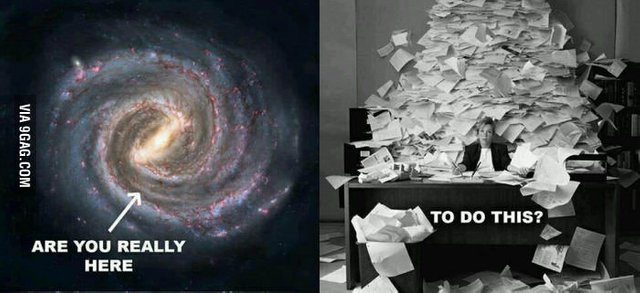
--
Another famous Ted Talk which made it to the list of Most Popular Ted Talks of All Time is that of author Elizabeth Gilbert where she talks about "[Our] own elusive creative genius." In the slight chance of a case you haven't seen it, it's worth the watch, and it describes the main topic of the next part of this article.
"But, ancient Greece and ancient Rome -- people did not happen to believe that creativity came from human beings back then, OK? People believed that creativity was this divine attendant spirit that came to human beings from some distant and unknowable source, for distant and unknowable reasons. The Greeks famously called these divine attendant spirits of creativity "daemons." Socrates, famously, believed that he had a daemon who spoke wisdom to him from afar." -- Elizabeth Gilbert
The concept of a Divine attendant Spirit, which comes to human beings from a distant and unknowable source, is not a concept which can only be found in the ancient religions of the Greeks and the Romans. It is an idea which we find scattered through all kinds of religions and traditions throughout the world. The Kami of the Japanese Shinto religion, the Deva in Hinduism, the Totem of indiginous people, all are comparable and very much alike to the Greek Daimones and Roman Genii. But closest of all is that Christian tutelary spirit best known as The Guardian Angel.
The term Angel comes from the Latin "Angelos" meaning messenger, and like Socrates' Daimon, Angels too are seen as "between divine and mortal" and as "interpreting and transporting human things to the gods and divine things to men; entreaties and sacrifices from below, and ordinances and requitals from above.." And as intermediaries between ourselves and the Divine they may be the closest we can get to understanding The Divine. As such the psycho-spiritual term "Higher Self" has often been used to describe the Guardian Angel, as this term is mostly used to describe that highest part of us which links us with the Divine.
There is however some debate amongst those who claim to have experienced their Holy Guardian Angels, with some being of the conviction that these Angels are autonomous celestial beings, composed of pure spirit; and others who are convinced that Angels are purely a psychological concept. And of that first group there are some who still look at Angels from a religious perspective and who believe they are supernatural beings; and others who believe that Angels are forces of Nature, even though their Nature far transcends the range of normal or physical human experience. All however describe the coming together with the Guardian Angel as an intense transformative experience which greatly impacts a person's live.
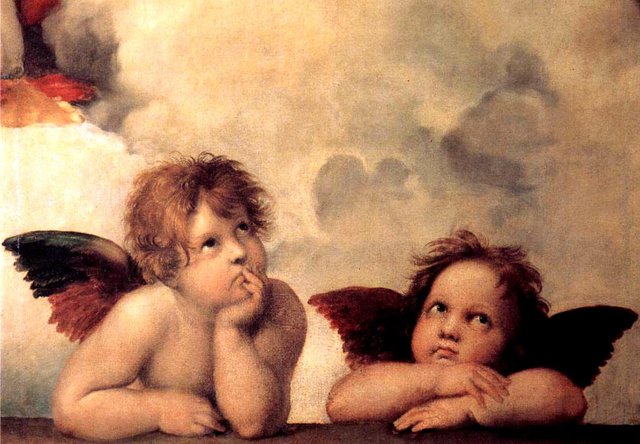
Cherubim by Rafael - Detail, Sistine Madonna - 1513-14
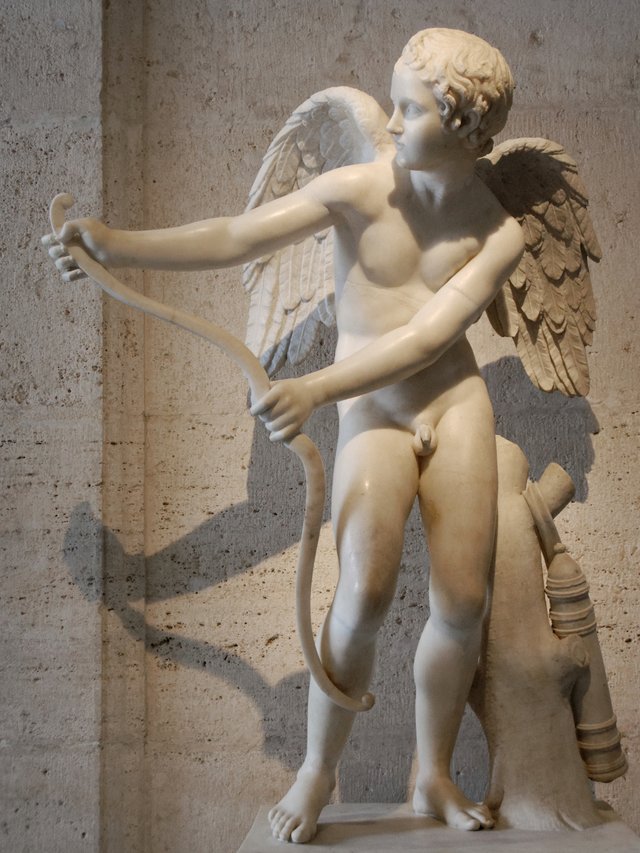
Eros, the Greek God of Love. Classical statue
The term Daimon wasn't solely used to describe personal guardian- or guiding Spirits. Like the Japanese Kami, Daimon loosely translates into God or power. It was a collective term which entailed Gods, and Spirits of little nature, like the nymph of a waterfall, or a Siren or a Satyr etc. Eros as the God of Love and affection represents a force which is not material, like a waterfall, particular locations in the sea, or wine and music. Love is still a natural force, but an experientially higher force of nature.
As our Holy Guardian Angels are the mediators between us and the Divine, to discover our True Will and to keep up the practice of acting in accordance with our True Will, we will need to attain what is called The Knowledge and Conversation of the Holy Guardian Angel. This means to receive the Knowledge of our True Will and to create an enduring conversation with our Divine Guardian Daimon, so we can receive the guidance to how we can get and remain in a position where we Do Nothing but our Will. The Holy Guardian Angel has thus come to be seen as the representative of our Will in this sense. Regardless of whether the HGA is a fluffy supernatural cherubim, a celestial Daimon composed of pure Spirit, or can be reduced to a mere psychological symptom; in all cases it is representative of our way toward True Freedom.
"You know, I think that allowing somebody, one mere person to believe that he or she is like, the vessel, you know, like the font and the essence and the source of all divine, creative, unknowable, eternal mystery is just a smidge too much responsibility to put on one fragile, human psyche. It's like asking somebody to swallow the sun." -- Elizabeth Gilbert
"I believe it is essential that each of us find his or her Element, not simply because it will make us more fulfilled but because, as the world evolves, the very future of our communities and institutions will depend on it." -- Ken Robinson
Doing what we are supposed to do is scary, and it takes guts. Trying to attain the K&C of your HGA is scary, and it is nuts. One such method of attaining the Knowledge and Conversation of your Holy Guardian Angel is described in a 15th Century Magickal manuscript called The Book of Abramelin. It requires the aspirant to go through a lengthy ordeal ranging from between 6 and 18 months, during which he or she isolates him or herself as much as possible from the outside world, and spends several hours a day in a previously prepared and consecrated Oratorium (prayer room) petitioning God to grant them the Knowledge and Conversation of the Holy Guardian Angel. It is a mystical process and experiences during that time can range from extremely beautiful to something like The Dark Night of the Soul, which is a sort of Spiritual depression. These however are very common symptoms and happen as a result of initiation regardless of the tradition in which one has chosen to initiate oneself (as long as the techniques are valid). The way toward freedom will always be dreadful and frightening. There does not seem to be any other way. Like Nietzsche's playing child which constructs and destroys, it involves the process of Solve et Coagula, or to completely break oneself down and the building of oneself together again. It is that same dreaded process of creation which we are going to have to apply to re-create ourselves.
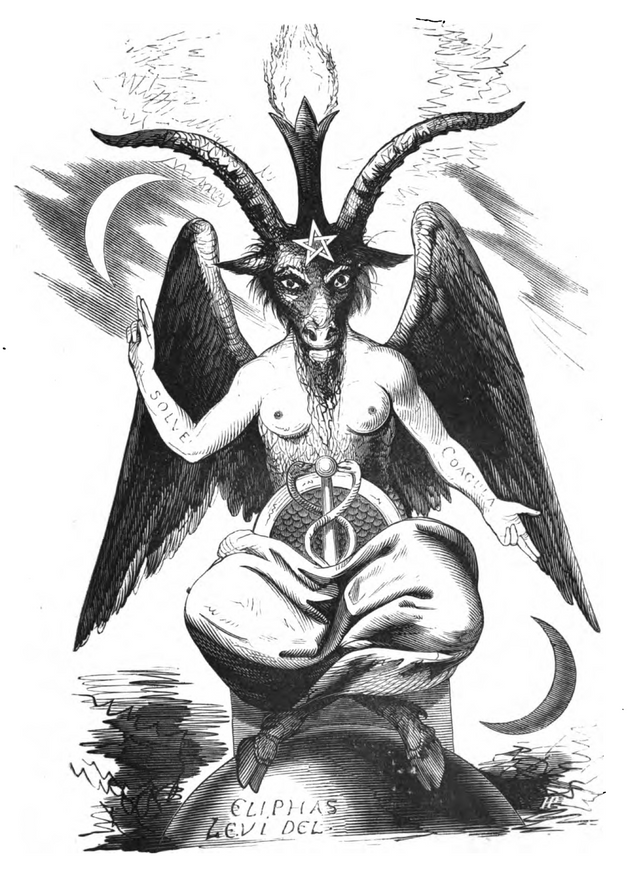
Baphometh by Eliphas Levi
In the video posted, Ken Robinson ends his talk with:
"[Michaelangelo] talked about the making of the statue of the David. And he said: "I did not make this sculpture, I didn't make the David. I reveiled it. It was there already in the stone. I can't take credit for it. I reveiled it." And I said it's an easy thing to do. Because all you have to do is to remove the bits that aren't the David. And there it is, that's all that you do as a sculptor, remove the bits that aren't the David. And I feel it's a good analogy for us. We should start removing the bits that aren't us, and allow the bits that are us to shine" -- Ken Robinson
This almost perfectly describes the mystico-alchemical process. The first part of the process are a destroying and ridding ourselves of the false ego, the desire-self, which is the chipping away at the stone (solve). The second part is the abrading and polishing of the stone (purification). And the third part is the creating of an entire new basis from the chipped away parts, on which the statue will be put on display (the putting back together again of all parts, or coagula). The whole image representing one who stands proudly on that which has been overcome.
Michelangelo's David, like a newborn
This of course happens all the time, in humans, and in wider nature. It is the old story of the metamorphosis of the butterfly from starting out as an egg, to becoming a larva (catterpillar), to pupa, to adult (butterfly). This means that this process would happen quite naturally if we would only let Nature do its job. This is the reason why many cultures from the beginning of time have all practiced some form of initiation ritual, and we still see many indiginous cultures practicing the same or similar rituals. This is what comes most natural to us. It does not have to be an elaborate rite as the Abramelin Operation (even if those are often the most effective), what matters is that we make that first step and search for who we truly are and initiate the change required to become that which we truly are to remain and nothing else. And if that would leave us with an Angel who guides us the rest of the way and who helps us to stay true to our own Nature, then all the better for us.
Thus I will leave you with that alchemical motto V.I.T.R.I.O.L., or Visita Interiora Terrae Rectificando Invenies Occultum Lapidem (Visit the interior of the Earth and by rectification thou shalt find the hidden stone.), and may you go on to find love, find light, find freedom, and to find the true purpose of your life.
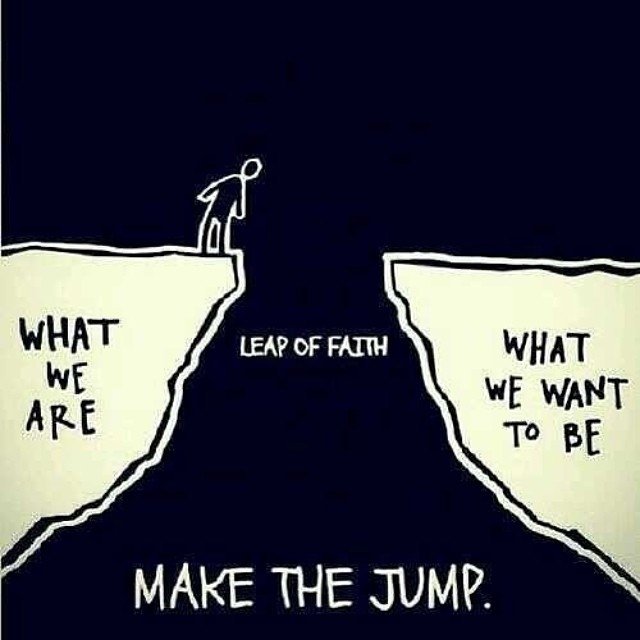
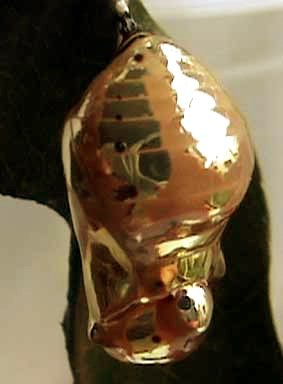
Chrysalis
Feel free to leave a comment and/or to follow if you are interested in reading more articles like these.
93 93/93 -- echion
Sources and Links:
https://en.wikipedia.org/wiki/True_Will
http://www.sacred-texts.com/oto/lib2.htm [Liber II - The Equinox Vol. 3 -1, The Blue Equinox]
Plato - Republic
http://www.lingua.amu.edu.pl/Lingua_17/lin-6.pdf [Yücel Dursun - The Onto-Theological Origin of Play: Heraclitus and Plato]
Heidegger, Martin - The Principle of Reason
Nietzsche, Friedrich - Philosophy in the Tragic Age of the Greeks
https://www.ted.com/playlists/171/the_most_popular_talks_of_all
Ken Robinson - The Element: How Finding Your Passion Changes Everything
https://en.wikipedia.org/wiki/Tutelary_deity
https://en.wikipedia.org/wiki/Daemon_(classical_mythology)
Plato - Symposium